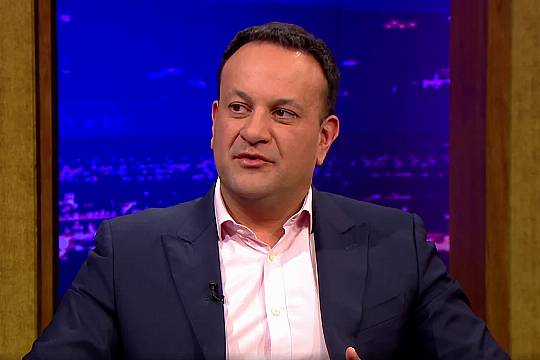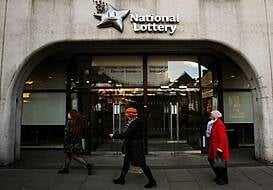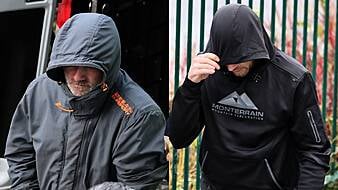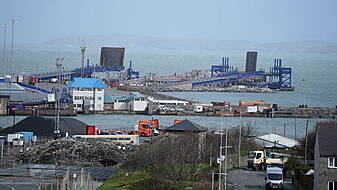Former taoiseach Leo Varadkar has admitted he “almost chickened out” of resigning the night before he surprised many with his announcement.
The 45-year-old resigned as taoiseach and Fine Gael leader last month, saying he felt he was no longer the right person to lead his party.
He then described his decision as both “personal and political”.
In a wide-ranging interview on RTÉ’s Late Late Show on Friday night, Mr Varadkar also expressed his concern at anti-immigration protests, and the impact they are having.
A day after a protest in Co Wicklow at a site earmarked for asylum seekers, Mr Varadkar said he was worried “about the extent to which migration and anti-migrant feelings are going to become part of our politics”.
“They’re centre stage in politics in most western countries. It was always going to be the case in Ireland,” he said.
“It’s just the nature of politics … it was very much what drove the election of Donald Trump as president – he was going to build a wall and all that.
“If you look across the water in Britain, when anti-migrant sentiment rose. Brexit was a big part of that, they were going to take control of their borders again. The official policy is to create a hostile environment for migrants, even if this strange Rwanda scheme, which cost €500 million and still hasn’t sent a single plane yet.”
Mr Varadkar said he loved leading Ireland, but said it “took over everything”, adding he has had no regrets.
He also suggested a time limit for the top job similar to in the United States.
“I think the hardest thing was actually going through with it – I nearly chickened out the night before,” he said.
“But it was definitely the right decision for me and I hope as well the right decision for the country too.
“It’s something that I had been thinking about for a few months but had only definitively made the decision in the days before.
“I was thinking back to 2017 when I first became taoiseach and I went into that meeting of 27 prime ministers, and I thought to myself, ‘there are only three or four of us left, most of whom are now going’, and in politics, as another former prime minister said to me once, there are really only three ways you cease to be prime minister – it’s a huge privilege to get there, quite hard to leave – so you either die, lose or resign, and if you’re not going to die or lose, resign is the only option, then it’s a question really as to whether it is voluntary or involuntary, and I always wanted to make sure it was my decision and on my terms.
“I think we have a good Government, I’d like to see it re-elected. For that to happen, my party has to do a bit better than it did last time, gain some seats, and I felt there was a better chance of that under a new leader.”
Mr Varadkar’s resignation came almost two weeks after two referendums proposed by the Government were defeated, and as 11 members of the Fine Gael parliamentary party said they would not contest the next election.
When Mr Varadkar was appointed Fine Gael leader in 2017, members had hoped he would be an electoral boon for the so-called “law and order” party.
But the 2020 general election saw a drop in support from 26 per cent in 2016 to 21 per cent, and the party failed to win a 2021 by-election.
Mr Varadkar said the party will need to do better at the next election, and said he did not believe he was the person who could lead Fine Gael to the needed gains.
He went on to suggest a limit for leadership terms.
“When you’re taoiseach it is very long hours, it is most evenings, most weekends. You’re always on and you’re always concerned and worrying about the problems that the country faces and people face and the time ahead,” he said.
“That that shouldn’t be forever, and you know, one thing they have in America for the top job, president, governor, is an eight-year term limit, and maybe that’s not such a bad idea.”
Asked whether he thinks he was a good taoiseach, Mr Varadkar said that will be for others to judge in the fullness of time.
“It’s too soon I think to make those kind of conclusions. You have to see what comes what comes next over the next three, four or five, six years to know for sure,” he said.
Asked what he regretted, Mr Varadkar said he felt the Government had been too cautious in 2011 following the financial crash.
“The economy bounced back way quicker than we thought… and we held back on some spending decisions, and we held back on some investment decisions. A lot of the new houses you see being built now, or some of the new transport improvements that are about to come online, could have happened five years ago had we known what we know now,” he said.
“The progress that we’re now seeing could have been much further along and then you would see a better situation with housing, a better situation with health. But that’s hindsight and hindsight is 20/20.”
Meanwhile, Mr Varadkar said he will make the decision on whether to stand in the next election in his Dublin West constituency in the coming weeks.







